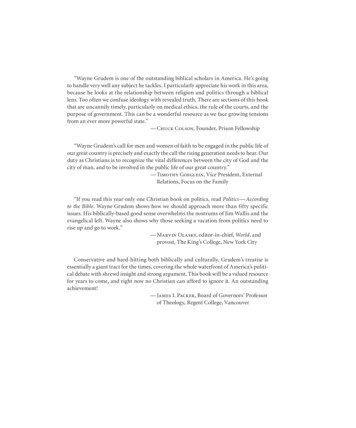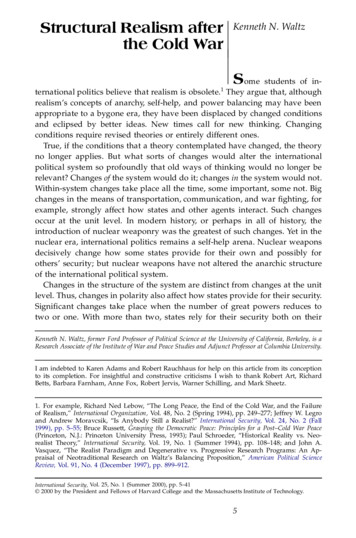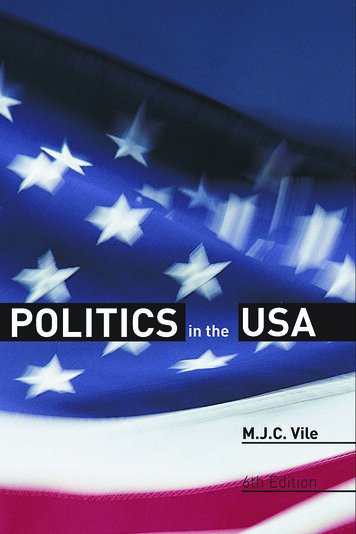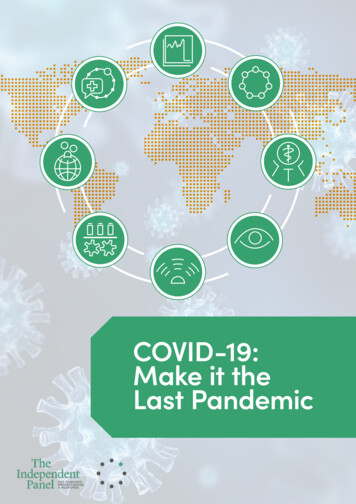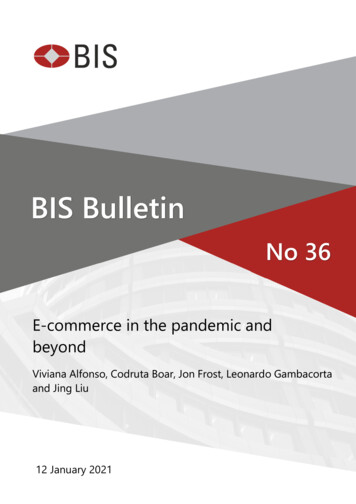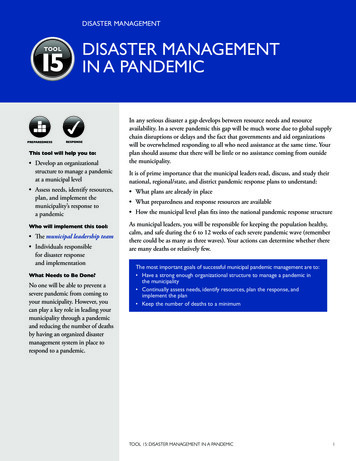
Transcription
IPC POLICY BRIEFOctober 2021POLITICS OF PANDEMIC MANAGEMENTIN TURKEYSenem Aydın-Düzgit, Mustafa Kutlay and E. Fuat KeymanExecutive SummaryTurkey has been hit hard by the COVID-19 pandemic. In the initial phases, the country showed an unexpected degree of resilience. In later phases, however, significant administrative issues and capacity-relatedchallenges surfaced. The Turkish case offers three key lessons: (1) an exclusive form of governance hindersthe successful management of a crisis on the scale of the COVID-19 pandemic; (2) a polarizing governmental discourse that demonizes its opponents weakens public trust in the government during a pandemic; (3)even in cases when anti-science denialism is not present (as in Turkey), an insufficient regard for scientificexpertise when scientific recommendations do not suit the government’s political and ideological prioritiescan lead to coordination and compliance failures.
P O L I T I C S O F PA N D E M I C M A N AG E M E N T I N T U R K E YAbout Istanbul Policy CenterIstanbul Policy Center (IPC) is a global policy research institution that specializes in key social and politicalissues ranging from democratization to climate change, transatlantic relations to conflict resolution and mediation. IPC organizes and conducts its research under six main clusters: The Istanbul Policy Center-Sabancı University-Stiftung Mercator Initiative Climate Change Democratization and Institutional Reform SHURA Energy Transition Center Urbanization and Local Governance Conflict Resolution and MediationSince 2001, IPC has provided decision makers, opinion leaders, and other major stakeholders with objectiveanalyses and innovative policy recommendations.2
O C TO B E R 2 02 1 I P C P O L I CY B R I E FA Brief Assessment of COVID-19 inTurkeyTurkey also experienced delays in vaccine rollout.The Turkish government reached an agreementwith China to receive 50 million doses of Sinovacvaccine—with the first shipment received in December 2020.5 The government launched a massive vaccination campaign in January 2021, initiallycovering healthcare workers, older citizens, andpeople in nursing homes. The Turkish governmentdid not initially receive any supply of the PfizerBioNTech vaccine to supplement the Sinovac vaccine. An agreement with BioNTech company wasnot reached until May 20, 2021.6 Once an adequatenumber of vaccines was secured, rapid vaccination started, and more than one million doses wereadministered each day. According to Our World inData, by the end of August 2021, 56 percent of thepopulation was at least partially vaccinated, and43 percent of the population was fully vaccinated,putting Turkey ahead of some other key emergingpowers, such as Brazil and India (see below).Turkey has been hit hard by the COVID-19 pandemic. The first COVID-19 case was reported on March11, 2020. Turkey’s performance has varied throughout the pandemic; as of September 1, 2021, the official number of confirmed cases was reported as6,435,773, with 57,283 deaths.1 In the initial phases,Turkey was thought to have dealt relatively wellwith the pandemic,2 given the low number of confirmed cases, timely isolation and tracing measures, and relatively strong healthcare system (e.g.,infrastructure in hospitals, especially in terms ofnumber of ICU beds). In later stages, however, certain administrative issues, questions about officialdata, and capacity-related problems emerged. Forinstance, the Minister of Health admitted on September 30, 2020 that asymptomatic positive caseswere not reported as part of the daily test results.Instead, “all official figures released since July 29referred only to ‘patients’ — meaning those exhibiting coronavirus symptoms.”3 By the end of August2021, in terms of the cumulative number of positivecases (per million people), Turkey had significantlyhigher numbers than many other countries, including India, Rwanda, South Korea, and Vietnam, yetlower than the UK and Brazil.4Throughout the pandemic the Turkish government pursued proactive policies to improve Turkey’s global image by providing COVID-19-relatedassistance outside its borders. According to a recent study, Turkey provided medical support—suchas masks and other types of personal protectiveequipment—to “more than 70 countries during thefirst months of the COVID-19 pandemic.”7 This canFigure 1. Share of people vaccinated in selected countries (August lSouth Koreashare of people partly vaccinatedTurkeyIndia364VietnamRwandashare of people fully vaccinatedSource: Data from Our World in Data (https://ourworldindata.org/covid-vaccinations). Authors’ own compilation. Figures wererounded to the nearest whole number. 3
P O L I T I C S O F PA N D E M I C M A N AG E M E N T I N T U R K E Ybe seen as an extension of Turkey’s ambitious foreign aid policy over the last decade to position itselfas a “humanitarian actor” in global governance.8 Atthe same time, the government’s extensive COVID19-related foreign aid attracted criticism from theopposition parties at home. For instance, Turkeydelivered 150,000 doses of vaccines to Libya’sGovernment of National Unity on April 14, 2021, atime when Turkish citizens were having difficultybooking vaccination appointments.9How Political Elites Framed theCOVID-19 PandemicThroughout the pandemic the Turkish politicalelite, across both the government and the opposition, framed COVID-19 as a global public healthcrisis. The government did not adopt an explicitlyanti-science stance, as seen in Brazil, for example.In fact, it consistently underlined the importance ofhealth precautions and later of vaccinations in combating the virus. Although Turkish President RecepTayyip Erdoğan has increasingly consolidated aform of one-man rule in recent years, he chose notto present himself as the face of the government’spolicy response. Instead, he empowered his Ministerof Health, Fahrettin Koca, a doctor and technocratwho has gained considerable trust from citizensacross party lines. Nonetheless, the governmentmade a conscious effort to present its handling ofthe crisis as a “success story” to the public in termsof the overall performance of the health sector aswell as economic and other related measures, particularly comparing Turkey to relatively “unsuccessful” country cases where the official rates of infection and mortality were higher. For instance, duringthe early months of the pandemic, Health MinisterKoca repeatedly stressed that unlike neighboringstates and EU countries, “Turkey’s resilience in itsstrategy and disciplined action plan in the face ofthe pandemic has never waned but increased byfar.”10 In April 2020, when infection and mortalityrates in certain European countries were on therise, Koca took pride in the fact that “Turkey hadthe lowest mortality rate in Europe, despite havinga relatively low doctors per person ratio.”11When infection and mortality rates started to risein May 2020, the government’s success story was4 temporarily put on the back burner, and the focusshifted to the importance of taking precautionarymeasures such as wearing masks and social distancing. In doing so, the government placed theresponsibility for the rising number of cases anddeaths on citizens, not itself.The success narrative once again became paramount by the end of the summer as numbers began to decline. In an October 2020 public speech,Health Minister Koca proudly stated, “We retainedour resilience against this disaster thanks to ourstrong infrastructure in health, our qualified anddevoted health workers and our strong public resources [while] witnessing that even in most developed countries, the capacities of the health sector and production proved inadequate.”12 PresidentErdoğan stressed the economic dimension of thesuccess by repeatedly asserting that Turkey hadmanaged to “couple its success in the health sector with the necessary social and economic support measures.”13Hence, it can be argued that throughout thepandemic, there was a considerable dissonancebetween the facts on the ground and the government’s portrayal of crisis management in itsdiscourse. Moreover, as the pandemic began totake its toll early in the summer of 2020 amidsteconomic recession, Erdoğan felt compelled to prioritize economic concerns at the expense of healthconsiderations, as witnessed in the early openingand relaxation of rules in June 2020, despite scientific advice to the contrary.Throughout the pandemic, the government provided a daily toll of those who were infected and thosewho lost their lives. Yet, the numbers were heavilycontested by both the public and the oppositionparties, who claimed these numbers were muchhigher than the official figures. The governmentfinally admitted that the daily count of infectionsdid not include asymptomatic cases, generatingfurther distrust in the government. The government’s narrative was also dismissive of the effortsof the opposition, especially the mayors from opposition parties, in combating the pandemic. Forexample, when the opposition mayors launchedfundraising campaigns early on in the pandemic,Erdoğan defined this as an attempt “to become a
O C TO B E R 2 02 1 I P C P O L I CY B R I E Fstate within the state” and, as such, could not betolerated by the government.14 Erdoğan also employed a strongly polarizing discourse, referring toopponents in the media and politicians who werecritical of the government’s measures as “akin tothe coronavirus,” while the state’s media watchdoglevied stiff fines on opposition news channels fortheir critical pandemic-related coverage.15The opposition parties did not challenge the government’s framing of the pandemic as a globalhealth crisis. In fact, in the early days of the crisis,Turkey even enjoyed a brief period when its deeplypolarized political elite—riven by a clash betweenPresident Erdoğan and his opponents—seemedto be uniting around the national response effort.However, this proved short-lived, and the government’s “success story” began to unravel underthe heavy criticism of opposition parties and theirleaders. Criticisms mainly centered on the inadequacy of economic support, delivery of foreignassistance despite domestic difficulties, misguidedmeasures (i.e., last-minute decisions to implementlockdowns, easing precautions while infectionswere at a peak), and distrust in official figures.Policies Implemented to TackleCOVID-19The Turkish government implemented a series ofmeasures to slow down the spread of the virus andmitigate its impact. On the political-social side, ascientific committee was established in January2020, three months before the first case was re-ported in the country. Minister of Health Koca washead of the scientific committee; he played a leading role in pandemic management as he regularlyupdated journalists and informed the public onhis social media accounts and other platforms. OnMarch 16, 2020, cafes and restaurants were closedtemporarily. A week later, people over 65 years ofage, representing nine percent of the overall population, were ordered to stay at home until furthernotice. The scope of the lockdown was extendedin April, and those under 20 years of age were alsoordered to stay at home. The lockdown measureswere altered several times throughout the pandemic until they were removed for all age groupsin July 2021 (see “Appendix: Timeline” for details).The Turkish government did not opt for a “fulllockdown” as in several other European countries.Production was not suspended, and no quarantinewas imposed on the workforce. Hence, the measures taken in Turkey can be considered “an enhanced partial lockdown.”16 Arguably, the primaryreason for refraining from a full lockdown was thedifficult economic circumstances in the wake ofCOVID-19. The Turkish economy was wobbling wellbefore the pandemic: inflation was on the rise, annual growth figures were sluggish, GDP per capita(in current prices) was in constant decline, unemployment was high, and external borrowing was agrowing concern. As the Turkish economy is heavily dependent on foreign capital inflows, reducedforeign direct investments in the 2010s amplifiedthe economic fragilities (see Table 1 below).17Table 1. Turkish economy, selected indicators2010201220142016201720182019GDP growth (%)8.54.85.23.27.52.80.9GDP per capita ( )10,50611,58812,11210,88310,6169,6939,127External debt (% GDP)37.739.343.647.453.356.258Inflation (annual %)6.46.28.28.511.920.311.8FDI (billion, 910.91113.7Source: Republic of Turkey, Ministry of Finance and Treasury. GDP per capita – in current prices (US ). External debt calculated aspercentage of GDP. FDI: annual inflow of foreign direct investment in US . 5
P O L I T I C S O F PA N D E M I C M A N AG E M E N T I N T U R K E Ycut interest rates to stimulate domestic demand,the president ousted two Central Bank governors.19Frequent political interventions into the monetarypolicy authority led to predictability and credibilityissues, causing concern among market actors andinternational investors.20 Second, Turkey could notimplement effective direct cash support schemesto those adversely affected by the pandemic. According to IMF Fiscal Monitor, Turkey’s additionalspending (e.g., cash aid, short-time work allowances, or unemployment benefits) or foregone revenue (e.g., reduction in VAT rates) was less than2 percent of its gross domestic product in 2020,compared to 16.5 percent in the UK, 25 percent inthe United States, and 8.8 percent in Brazil (seefigure below). The average additional spendingand foregone revenue as a percent of GDP werehigher in emerging markets and middle-incomeeconomies (4 percent) and advanced economies(16.62 percent) than in Turkey. In other words, thedifficult economic situation already present beforethe pandemic limited the state’s fiscal capacity toadequately support Turkish taxpayers under theseexceptional circumstances.The COVID-19 crisis magnified the existing economic problems in Turkey.18 For example, in thesummer months, the decreased revenues fromtourism put severe pressure on several sectors.Moreover, COVID-19 accelerated the deglobalization trend in the international economy that wasalready underway. The EU constitutes the largesttrading partner for Turkish firms, accounting for almost 40 percent of Turkey’s total trade. Thus, withthe COVID-19 pandemic, the Turkish economy feltthe knock-on effect of economic contraction inEuropean markets because of closed borders andreduced production. Supply chain problems in Europe and reduced economic production capacitydue to extensive quarantines in several EU memberstates led to a collapse in Turkey’s export figures.The government implemented a set of expansionary economic policies to counter the adverse impacts of the pandemic. However, the monetaryand fiscal measures were not optimal for two mainreasons. First, the government’s stance on monetary policy was unpredictable. After the start ofthe pandemic, believing the Central Bank shouldFigure 2. Fiscal measures in response to COVID-19 (percent of GDP)3025.52520151014.416.416.2 16.111.39.48.87.66.24.852.40SpainUKUSA0.7 1.2Mexico1.9TurkeyEquity, loans, and ndia EMMIEsAEsAdditional spending and forgone revenueSource: IMF Fiscal Monitor, April 2021. Data from March 17, 2021 for selected countries. According to the IMF database on fiscalpolicy responses to COVID-19, “percent of GDP are based on April 2021 World Economic Outlook Update.” EMMIEs: emerging market and middle-income economies; AEs: advanced economies. Definitions of different types of fiscal measures can be found in IMFFiscal Monitor, April 2020.216
O C TO B E R 2 02 1 I P C P O L I CY B R I E FA Case of Success or Failure?Aydın-Düzgit and Keyman point out in an earlierpaper that state capacity and “good/inclusivegovernance may be a better fit in explaining thelower number of deaths in countries than othervariables.”22 Other studies have similarly highlighted the importance of state capacity in dealing withthe COVID-19 pandemic and governing under uncertainty.23 One of the challenges of the COVID-19pandemic is that it began in the midst of majorpower shifts in the international order and a concomitant rise in authoritarian populist movementsin both the Global North and South. Authoritarianpopulist leaders “justify the use of ‘strong leadership,’ their low regard for checks and balances, andthe exclusion of ‘intermediary powers’ between the‘people’ and the ‘leader’ on the basis of delivering fast and effective responses to these risks andcrises.”24 Otherwise stated, populist leaders undermine state capacity and fail to utilize existing resources and networks at the state-society nexus.Mazzucato and Kattel point out that governmentsmust develop certain “dynamic capabilities” totackle 21st-century governance challenges. Theyidentify these capacities as the “capacity to adaptand learn; capacity to align public services and citizen needs; capacity to govern resilient productionsystems; and capacity to govern data and digitalplatforms.”25 As aforementioned, unlike Jair Bolsonaro’s leadership in Brazil, the Turkish ruling eliteframed COVID-19 as a global health issue from thestart. It is also true that Turkey fared relatively wellin the initial phases of the pandemic compared toseveral other European countries thanks to its highnumber of intensive care unit (ICU) beds, favorable demographics, and better health infrastructure.26 However, the political context was severelypolarized, and Turkey demonstrated a sub-optimalperformance that could have been stronger andmore effective if inclusive governance policieswere adopted. The evidence so far suggests Turkey struggled during the pandemic in terms of thestate’s extractive, coordination, and compliance capabilities.27 This argument has two strands.First, state capacity is a polymorphous conceptthat should not be studied in the abstract. A state’scapacity is likely to diverge across sectors and pol-icy areas.28 In Turkey, a relatively strong healthcaresystem and experienced human capital helped thecountry weather the storm—particularly in the initial months of the pandemic. However, the story isdifferent with respect to the state’s extractive anddistributive capacity. As explained in the previoussection, poor economic performance and suboptimal allocation of economic resources tied thehands of policymakers in the midst of the pandemic. Due to the limited fiscal capacity of the state,the government could not provide adequate cashsupport for Turkish taxpayers and did not offer afurlough scheme. As a result, the working classshouldered the burden of the pandemic.Second, available resources could have been utilized more effectively in coordination with municipalities and civil society actors. As the literaturehighlights, state capacity refers to ruling throughsociety, not over it.29 Major municipalities such asIstanbul, Ankara, and Izmir launched fundraisingcampaigns to provide additional social assistancein the midst of the pandemic. This could havehelped to mitigate the capacity problems of thecentral government. The Ministry of Interior Affairs,however, banned the opposition municipalitiesfrom raising funds and limited most of their activities to providing additional social assistance. Thegovernment’s antagonistic relationship with theopposition municipalities and civil society actors atthe local level enfeebled the capacity of the stateto deal with an unprecedented pandemic.Lessons LearnedThe Turkish case provides three key lessons in crisis management for the countries of the GlobalSouth and beyond.First, it shows that an exclusive form of governance hinders the successful management of a crisis on the scale of COVID-19. The exclusion of localgovernments controlled by the opposition partiesfrom pandemic management weakened the coordination capacity of the state in the delivery ofresources and the implementation of centrally designed policies. In Turkey, conflict with local governments even weakened the extraction capacityof the state, as the resource-generating capacityat the local level was obstructed. Exclusive gov- 7
P O L I T I C S O F PA N D E M I C M A N AG E M E N T I N T U R K E Yernance even extended to civil society organizations, which, in turn, led to implementation failures.The most visible example was the delivery of freesurgical face masks to citizens in the early monthsof the pandemic—a gesture intended to show thegovernment’s commitment to its citizens. The government suffered multiple implementation failures,however, and was ultimately forced to drop thepolicy, precisely because it chose to exclude actorssuch as municipalities and pharmacists’ associations when their inclusion could have ensured effective delivery.30Second, and in a related sense, the Turkish caseshows us that a polarizing governmental discoursethat demonizes its opponents weakens public trustin the government and its measures across certainparts of the population during a pandemic, andthus leads to noncompliance with healthcare, social distancing, and related sanitary rules designedto prevent the transmission of the virus. It alsodemonstrates how the suppression of social actors,including medical organizations and the scientificcommunity, can obstruct the flow of credible information, leading to the further loss of public trustand reduced compliance with the measures suggested by the government. Public opinion pollsshow the percentage of the Turkish public whodid not trust government declarations and officialfigures on COVID-19 increased from 30 percent inApril 2020 to 58.9 percent in August 2020.31 Following a last-minute lockdown announcement inApril 2020, many citizens did not trust the government’s claim that the lockdown would be limited to48 hours; consequently, tens of thousands rushedout to stock up on supplies, risking further infections.Third, even in cases when anti-science denialism isnot present (as in Turkey), insufficient regard forscientific expertise when scientific recommendations do not suit the government’s political andideological priorities can lead to both coordination and compliance failures. For instance, the illtimed and sudden opening on June 1, 2020 wasa decision based on economic concerns. It wentagainst the recommendations of the Turkish Medical Association, certain members of the scientificadvisory board, and even economic experts whoall suggested a more gradual normalization. This8 decision substantially lowered compliance withsocial distancing measures, ultimately leading to ahigher number of official cases and deaths duringthe summer than in most European states.32It goes without saying that COVID-19 posed unprecedented challenges to states and societiesacross the world, and it has taught us a lesson. Thewidespread uncertainty, economic pressures, andanxiety brought on by the pandemic suggest theneed for an overhauled institutional architecture.States need to be adaptive, resilient, agile, andmore responsive to citizens’ demands when dealing with these new types of risks. As we discussin this policy brief, the Turkish case demonstrateshow crucial it is to invest in state capacity, inclusivegovernance, and conciliatory political leadership intimes of severe crisis and post-crisis governance.
O C TO B E R 2 02 1 I P C P O L I CY B R I E FAppendix: Timeline of the COVID-19Pandemic in TurkeyNote: Please click on the links to access news sources for further information. We would like to extendour special thanks to Ali Baydarol for his excellentresearch assistance and for preparing the timeline.March 11, 2020 – Case Numbers– The first coronavirus case was detected in Turkey.March 13, 2020 – Municipality – The Council ofState decided that municipalities should collectdonations.March 16, 2020 – Lockdown – The entertainmentsector, cafes, and restaurants were temporarilyclosed.March 18, 2020 – Death Numbers– The first deathfrom coronavirus was recorded in Turkey.March 20, 2020 – Case Numbers – The number ofcases exceeded 100 (168) for the first time.March 22, 2020 – Lockdown – A lockdown imposed on citizens aged 65 and over and those withchronic illnesses was implemented for the firsttime.March 27, 2020 – Case Numbers – The number ofcases exceeded 1,000 (1,196) for the first time.March 31, 2020 – Foreign Aid – Health equipmentfrom Turkey was sent to Italy and Spain by militaryplane.announced his resignation. President Erdoğan didnot accept his resignation.April 12, 2020 – Case Numbers – The total numberof cases reached its peak (5,138).April 14, 2020 – Foreign Aid – Thousands of maskswere donated to Italy, Spain, Serbia, China, Iran,Kosovo, and Iraq.April 15, 2020 – Death Numbers – The number ofdaily deaths from coronavirus exceeded 100 (107).April 18, 2020 – Foreign Aid – Foreign MinisterMevlüt Çavuşoğlu states that “Turkey provided aidto 44 of the 116 requesting countries.”April 24, 2020 – Foreign Aid– Turkey provided aidto Lebanon, Afghanistan, and Kyrgyzstan.April 28, 2020 – Foreign Aid– Turkey provided aidto the United States.April 28, 2020 – Foreign Aid – Turkey sent aid toBosnia and Herzegovina, Sudan, Palestine, Georgia, Colombia, Yemen, Azerbaijan, Kyrgyzstan, Pakistan, Tunisia, and Somalia.April 29, 2020 – Foreign Aid– Turkey provided aidto South Africa.May 4, 2020 – Foreign Aid - Turkey provided aid toRomania and the Kingdom of Lesotho.May 5, 2020 – Foreign Aid – Turkey provided aidto Pakistan.May 7, 2020 – Foreign Aid– Turkey provided aid toGeorgia and Mozambique.April 3, 2020 – Lockdown – The lockdown extended to include those aged 20 and under.April 10, 2020 – Lockdown – The first weekendlockdown was announced Friday night, two hoursbefore the start of the lockdown and markets closing.April 10, 2020 – Foreign Aid – Health equipmentwas sent to the UK.April 12, 2020 – Soylu’s Resignation – The Minister of Interior, Süleyman Soylu, took responsibility for the late announcement of the lockdown andMay 11, 2020 – Foreign Aid– Turkey provided aidto Cameroon.May 14, 2020 – Foreign Aid– Turkey provided aidto Bangladesh.May 18, 2020 – Foreign Aid– Turkey provided aidto Mongolia.May 16–19, 2020 – Lockdown – Lockdown was declared in 15 provinces.May 22–26, 2020 - Lockdown – Lockdown was declared in every province. 9
P O L I T I C S O F PA N D E M I C M A N AG E M E N T I N T U R K E YJune 9, 2020 – Foreign Aid– Turkey provided aidto Kyrgyzstan.June 19, 2020 – Foreign Aid– Turkey provided aidto South Sudan.December 4, 2020 – December 7, 2020 – Lockdown – The scope of the lockdown measures wasextended from Friday at 21:00 to Monday 5:00.These full weekend lockdown measures continueduntil June 5.June 26, 2020 – Foreign Aid– Turkey provided aidto Bosnia and Herzegovina and the Kingdom of Eswatini.December 26, 2020 – Vaccination– Turkey made adeal with China to receive 50 million doses of Sinovac vaccine.July, August, September, and October (2020) –No lockdown was imposed in these months. Lockdown measures restarted in November 2020.July 10, 2020 – Foreign Aid – Turkey provided aidto South Sudan.September 30, 2020 – Unreliable Data – HealthMinister Fahrettin Koca admitted that asymptomatic positive cases were not included in the daily number of new cases announced. Turkey reassessed thetotal number of cases on November 25, 2020.October 21, 2020 – Foreign Aid– Turkey providedaid to Tunisia and Mozambique.November 12, 2020 – Foreign Aid– Turkey provided aid to the Republic of Djibouti.November 12, 2020 - Lockdown– Lockdown imposed every day in certain provinces (except between 10:00 and 16:00) for people aged 65 and over.December 30, 2020 - Vaccination – Three milliondoses of the Sinovac vaccine arrived in Turkey.December 31, 2020 – Lockdown – A four-day lockdown was implemented on New Year’s Eve andcontinued until January 4, 2021.January 13, 2021 - Vaccination – The first coronavirus vaccine (Sinovac) was given to Health MinisterKoca.January 14, 2021 – Vaccination – Vaccinationstarted for healthcare professionals.January 19, 2021 – Vaccination – Vaccination started for citizens aged 90 and over, those in nursinghomes, and those who care for them.January 20, 2021 – Vaccination – The number ofpeople who had the coronavirus (Sinovac) vaccineexceeded one million.January 21, 2021 - Vaccination – Vaccination started for those aged 85 and over.January 25, 2021 – Vaccination – Vaccinationstarted for those aged 80 and over.November 13, 2020 – Lockdown – The previouslyimplemented lockdown measures were reimposedfor people aged 65 and over in all provinces.January 27, 2021 – Vaccination – Vaccinationstarted for those aged 75 and over.November 21, 2020 - Lockdown – Weekend lockdowns (from Saturday at 20:00 to Monday at 5:00)were implemented.February 11, 2021 - Vaccination – Vaccinationstarted for those aged 70 and over.November 25, 2020 – Unreliable Data and CaseNumbers – Asymptomatic cases were added to thedaily coronavirus case count.November 30, 2020 – Lockdown –Weeknight curfews (from 21:00 to 5:00) were implemented andcontinued until July 1, 2021.10 February 12, 2021 - Vaccination – Vaccinationstarted for those aged 65 and over.February 14, 2021 – Foreign Aid– Turkey providedaid to Palestine.February 22, 2021 – Foreign Aid – Turkey providedaid to Mongolia.
O C TO B E R 2 02 1 I P C P O L I CY B R I E FMarch 22, 2021 – Foreign Aid– Turkey provided aidto Northern Syria.March 23, 2021 – Foreign Aid – BioNTech vaccinesarrived in Turkey for the first time (1.4 million doses).April 6, 2021 – Relations with China and Vaccination – The Chinese Embassy responded to Iyi Partyleader Meral Akşener’s statement about the independence of East Turkestan, saying “The Chineseside reserves its right to give a just response.” Thenumber of doses of Sinovac delivered to Turkey,which was expected to be 50 million, has since remained at 26 million.April 14, 2021 – Fore
was imposed on the workforce. Hence, the meas-ures taken in Turkey can be considered "an en-hanced partial lockdown."16 Arguably, the primary reason for refraining from a full lockdown was the difficult economic circumstances in the wake of COVID-19. The Turkish economy was wobbling well before the pandemic: inflation was on the rise, an-

